For this special edition episode of Cutting Edge, we're breaking with tradition a little and, for the first time, looking at the classification issues regarding two video games -- Manhunt (2003) and Manhunt 2 (2007) as released by
Rockstar Games.
Doorway into Hell
In November 2003, Rockstar published the visceral survival horror game Manhunt for the PlayStation 2, with PC and Xbox releases following in April 2004. The
game sees the player taking on the role of James Earl Cash who is saved from Death Row by an unseen man calling himself The Director (voiced by Brian Cox). Cash is promised his freedom if he follows The Director's instructions, who communicates to Cash
via an earpiece. Over the course of numerous levels, Cash is forced to kill a variety of gang members with various weapons. All the while, The Director films these murders via CCTV cameras he has fitted around the city in order to produce a snuff film
from the footage. The Director later kills Cash's family, leaving him for dead, and Cash vows revenge. Learning that The Director is Lionel Starkweather, a failed movie producer, Cash tracks him down to his sprawling mansion, killing him with a chainsaw.
In the United States, Manhunt received an 'M for Mature' rating by the Entertainment Software Rating Board (ESRB) which, in their own words, denotes that the:
"Content is generally suitable for ages 17 and up. May
contain intense violence, blood and gore, sexual content and/or strong language."
In general, the game was critically acclaimed, and its unique premise and grisly theme were cited as positives in various reviews. GameSpot said
that Manhunt "pushed the envelope", whilst Levi Buchanan, writing in the Chicago Tribune, argued that it signified a turning point in video game history:
"Manhunt is easily the most violent game ever
made. What elevates it to a grotesque, chilling work of art is both presentation and game play. It's engaging to use stealth as you creep through the streets of this wicked city, using your smarts to avoid death, while dishing out much of your own. If
Manhunt succeeds at retail, it will say more about America's fascination with violence than any political discourse or social debate. That makes Manhunt the most important video game of the last five years."
However, Manhunt
was not without its detractors -- even the people working on the game felt uneasy about it, as former Rockstar Games employee Jeff Williams recounted in 2007:
"There was almost a mutiny at [Rockstar] over that
game... [it] just made us all feel icky. It was all about the violence, and it was realistic violence. We all knew there was no way we could explain away that game. There was no way to rationalize it. We were crossing a line."
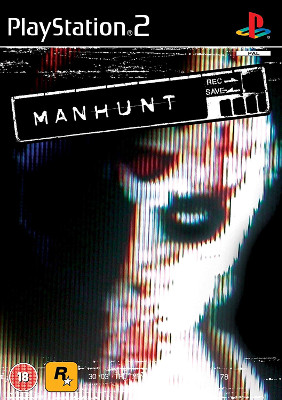
Manhunt would end up being classified by the BBFC in the UK on
October 10th 2003, who gave it a well-deserved 18 rating for "strong bloody violence". In commenting on their decision, the BBFC remarked:
"The game contained strong personalised violence, including the
killing of enemies by strangulation, suffocation, stabbing and a whole array of nasty and dangerous implements... It offered a nightmarish environment whose realism was limited by the quite crude animation of its humanoid and faceless characters. The use
of strong language and violence placed this at '18', though the limited nature of these pleasures meant that there was no reason to require cuts to the game."
Road to Ruin
Further controversy followed when Manhunt was linked to the killing of 14-year-old Stefan Pakeerah at the hands of his friend, Warren Leblanc on February 26th 2004. Leblanc had beaten and stabbed Pakeerah to death, leaving the teenager with at least 50
separate injuries. Early media reports indicated that a copy of Manhunt had been found in Leblanc's room, with Pakeerah's parents citing "some connection" between the game and the killing. Some retailers took copies of the game off their
shelves, whilst others like HMV kept selling it and actually saw demand for the game increase. In August 2004, detectives investigating Pakeerah's murder denied any link between the event and Manhunt, citing robbery as the motive for the crime. They also
confirmed that whilst a copy of the game had been found, it had actually been located in Pakeerah's home and not the home of his killer.
The Entertainment and Leisure Software Publishers' Association (ELSPA), which was the industry body for
the video game industry at the time, wrote to then Home Secretary David Blunkett about the media coverage of the case, remarking:
"We have been very concerned recently about the misleading and disingenuous
reporting about the effects of playing interactive games software. As you will know, despite many research projects into the effects of screen violence, some of which have been undertaken by eminent academics in their field, no link with violent
behaviour has been found."
Later, at Warren Leblanc's sentencing, Judge Michael Stokes at Leicester Crown Court remarked:
"I do not pretend to know or understand what prompted you to
behave as you did. One thing is clear; you and you alone were responsible for this prolonged, vicious and murderous attack on someone who thought of you as a friend."
Leblanc was jailed for life, with a minimum sentence of 13
years, on September 3rd 2004.
Awakening
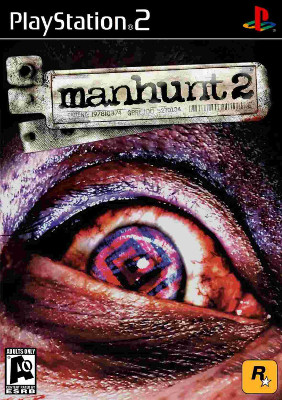
On February 6th 2007, Take-Two Interactive (Rockstar's parent company) announced the forthcoming release of
Manhunt 2 via their website, with a teaser trailer following shortly afterwards. The game was to be released on the PlayStation 2, PSP and Nintendo Wii platforms on July 10th. Set in 2007, Manhunt 2 follows Daniel Lamb and Leo Kasper after their escape
from the fictional Dixmor Asylum for the Criminally Insane. Having lost his memory, Daniel is unable to recall how he ended up in the asylum. With Leo guiding him, Daniel slowly begins to remember bits and pieces of his former life. The bulk of the game
sees the duo teaming up to discover the secrets of Daniel's past, whilst they are pursued by agents of a mysterious organization called The Project. As the plot unfolds, Daniel learns he was a scientist employed by the Pickman Project; a
government-sponsored program centered around mind control techniques. The Project developed the Pickman Bridge; a brain implant which contained the personality of a skilled assassin which could be activated at will. This would allow two separate
personalities to co-exist in a single person's mind. Six years prior, Daniel had volunteered himself as a test subject for the Pickman Bridge, hoping that the payment for his services would help with his family's financial debts. But the Bridge
malfunctioned and gave Daniel dissociative identity disorder, which enabled him to directly communicate with his implanted personality, Leo. Leo's personality overcame Daniel's own, causing Daniel to kill his wife and partake in a murderous rampage
across the city. After Daniel learns the truth, he enters a hypnotic trance and "kills" Leo within the confines of his mind, finally regaining control of his life.
Manhunt 2 arguably surpasses the first game in terms of its tone and the strength of its violent and sexual content. Unlike the first game, which centered around the antihero Cash being forced to kill to earn his freedom, Manhunt 2 is based around the
unsettling premise of an innocent man being made to kill for the government, who would then have no knowledge of his actions. Throughout the game, Leo incites Daniel to commit murder and these killings are arguable more sadistic and graphic than the
first game. But Manhunt 2 is not without morals. For one, Daniel is seen to clearly disapprove of the violence he involves himself in at various stages of the game, remarking at one point, "I'm sick of this". From the very start, he is forced
into a depraved world of abuse, corruption and horror from which the player has little or no respite. Craig Conner's haunting score ebbs and flows in the background, rising into driving, throbbing ambience when the player is discovered by the enemy,
which adds greatly to its atmosphere. Manhunt 2's world is a deeply unsettling horror experience, but it was intended to be, and it is a game that is clearly aimed at an adult audience, made by a team of people who love and respect the horror genre.
Assassination
After the Official PlayStation Magazine in the UK got a first look at Manhunt 2 in March 2007, and with further coverage continuing to build over the coming months, some rather shocking news followed. Rockstar had submitted the game to the ESRB in
the United States and the BBFC in the UK for ratings, and on June 19th the BBFC declared that the game had been rejected for classification. The BBFC's director David Cooke issued a statement at the time, which read in part as follows:
"Manhunt 2 is distinguishable from recent high-end video games by its unremitting bleakness and callousness of tone which constantly encourages visceral killing. There is sustained and cumulative casual sadism in the way in which
these killings are committed, and encouraged, in the game. The game's unrelenting focus on stalking and brutal slaying and the sheer lack of alternative pleasures on offer to the gamer contribute towards differentiating this submission from the original
Manhunt game. The Board's carefully considered view is that to issue a certificate to Manhunt 2 would involve a range of unjustifiable harm risks, to both adults and minors, and that its availability would be unacceptable to the public."
Rockstar Games also issued a statement soon after the BBFC ban, stating:
"We are disappointed with the recent decision by the British Board of Film Classification to refuse classification of
Manhunt 2. While we respect the authority of the classification, we emphatically disagree with this particular decision. Manhunt 2 is an entertainment experience for fans of psychological thrillers and horror. The subject matter of this game is in line
with other mainstream entertainment choices for adult consumers."
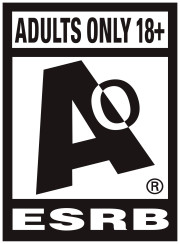
As if the BBFC ban wasn't bad enough, hours later the ESRB announced that they had issued the game with an 'AO' rating in the US, which denoted that the game was for sale to adults only. Nintendo and Sony issued statements the next day clarifying that
'AO' rated titles were not permitted on their platforms, meaning that a North American release of the title would also not be possible. Indeed, most major US-based retailers refuse to stock 'AO' titles as they do with 'NC-17' titles; a perpetually
frustrating experience for adult gamers. Regarding the ESRB rating, Jeronimo Barrera, Vice President of Product Development at Rockstar, later commented to MTV News that:
"We were floored by the AO rating
because we thought we were definitely still in M-rating territory with what we originally gave. It was a bummer, and we immediately said, 'Let's figure out what we're going to do with this.'"
Altered State
Two days after the BBFC ban, on June 21st Take-Two announced that they were suspending the release of Manhunt 2 for the foreseeable future, while they assessed the options available to them.
Rockstar issued a statement on August 1st saying they had appealed the BBFC over their decision to ban the game, but this appeal was later put on hold when Rockstar began to made changes to the game, since it was apparent that the only way for it to get
a release was to tone down the violence. As a result, at least six main changes were implemented.
Cut Scenes: Executions The first major change made to the game was an obscuring effect added to all of the execution cutscenes. In the 'AO' version, these killings featured a red color-wash effect, but the
censored version added flickering red, green and monochrome filters along with blurring effects, which disguised much of the more violent details. But these in-game executions were not only obscured but altered in some instances.
|
Cut Scenes: Wire cutters Four wire cutter executions were removed entirely, including the sight of the player sawing at an enemy's genitals and then slicing off an enemy's head. On top of this all but two
decapitations were removed, since two individual occurrences were needed for key plot points in the story.
|
Cut Scenes: Pliers to the balls Further changes to violence were also implemented, with the original pliers execution that originally showed the player tearing off an enemy's testicles being replaced with
a less graphic killing of the player beating the enemy over the head. The pliers were retained as a weapon, however, so that the player could still cut through wire fences as they progressed through levels.
|
Cut Scenes: Pliers to the face A cutscene in the level entitled Red Light was also altered to remove sight of pliers being used on a civilian's face, with new camera angles used to obscure details of the
killing.
|
Cut Scenes: Innocents Another change involved the removal of innocent characters, or NPCs (non-playable characters) from certain levels. In the original version of the game, the presence of these NPCs helped shaped
the game's moral compass, which offered a choice between two endings depending on how Daniel Lamb had acted. If Daniel spared such innocents, the player received the positive ending where Daniel triumphs over Leo. If Daniel killed these characters, the
negative Leo ending would play. |
Cut Scenes: Scoring On a similar vein, the 'AO' version of the game included a scoring system like the first game, where more violent kills would result in the player receiving a higher ranking at a level's end. This,
too, was eliminated to achieve a lower classification. In response to this change, Jeronimo Barrera stated in an interview with MTV News that: "The scoring was a hold-over from the first game, and when we had the
opportunity to make edits because of the rating, we decided to remove it. We felt it flowed better without a score screen between levels."
|
After changes had been made to the game, Manhunt 2 was resubmitted to the ESRB in the United States and the BBFC in the UK. The ESRB were content with the alterations, and Rockstar reported the Board had issued the game with an 'M' rating on August
24th for. The game would go on to be released in the United States, rather appropriately, on Halloween 2007, almost four months after its original intended release date. Rockstar also submitted the modified 'M' version of the game to the BBFC in the
hopes of attaining a classification, but their efforts were apparently in vain. On October 8th , the BBFC announced that Manhunt 2 had once again being refused a BBFC certificate. David Cooke commented on the Board's decision, remarking:
"The impact of the revisions on the bleakness and callousness of tone, or the essential nature of the gameplay, is clearly insufficient. There has been a reduction in the visual detail in some of the 'execution kills', but in
others they retain their original visceral and casually sadistic nature. We did make suggestions for further changes to the game, but the distributor has chosen not to make them, and as a result we have rejected the game."
Under
terms set out in the Video Recording Act of 1984, Rockstar Games had the right to appeal the BBFC's decision, which they did. On November 26th , both Rockstar and the BBFC argued their cases to the Video Appeals Committee (VAC). Two weeks later, Rockstar
won their appeal with the VAC votes being 4-3 in favor of Rockstar. Great news, for sure. Alas, Manhunt 2 would run into more trouble.
Most Wanted
On December 17th , the BBFC revealed that they were taking the Manhunt 2 appeal to the High Court, arguing that that VAC's interpretation of "harm" in the legal sense of the word had been misinterpreted in the context of the Video Recordings
Act. The Board was granted this judicial review on December 21st , and on January 24th 2008 the BBFC won their case. Presiding Judge John Mitting agreed with the BBFC's argument that the VAC had been in error when considering whether the game could be
harmful to minors and ordered the same seven-member VAC panel to re-evaluate their original decision in light of this new evidence. Whatever decision at which the panel now arrived would be legally binding.
On March 11th 2008, the reconsideration
hearing took place. Just as they had done three months prior, the VAC panel voted 4-3 in favor of Rockstar's appeal, meaning that Manhunt 2 would have to be released in the UK, albeit in its censored form. In an act that suggests the BBFC were determined
to keep Manhunt 2 out of UK stores, the BBFC sought legal advice about challenging the VAC's decision. After being informed that there was no realistic basis for a further challenge to the ruling, the Board was forced to issue Manhunt 2 with an 18
rating. BBFC Director David Cooke remarked at the time, perhaps somewhat reluctantly, that:
"We twice rejected Manhunt 2, and then pursued a judicial review challenge, because we considered that it posed a real
potential harm risk. However, the Video Appeals Committee has again exercised its independent scrutiny. It is now clear, in the light of this decision, that we have no alternative but to issue an 18 certificate to the game."
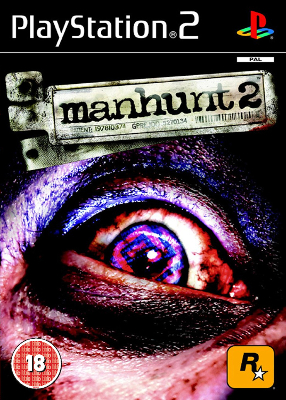
Manhunt 2 was finally released in the UK on October 31st 2008 in the same
'M'-rated version that had been released in the USA a year prior. No additional censorship had been made to the UK version. In their final evaluation of the game, the BBFC further commented that:
"MANHUNT 2 has
been classified '18' for very strong bloody and sadistic violence, which takes the form of stealth executions. Each killing is graphically portrayed as a brief video scene where weapons are seen to impact on various parts of the victim's body coupled to
realistic sound effects and blood spurts. The cumulative effect of these killings creates a very strong impression of almost continuous violence and horror which is too strong to be contained at any category below '18'. The game is entirely unsuitable
for anyone below this age."
The original 'AO' version of Manhunt 2, which contains none of the changes made for the ESRB and BBFC, remains banned in the UK. However, this version of the game was later made available for the PC in
the United States. The ESRB classified the uncensored version in August 2009 with an 'AO' rating, which was later released on the online store Direct2Drive on November 6th 2009. To date, however, the 'AO' version appears to have disappeared from online
gaming stores.
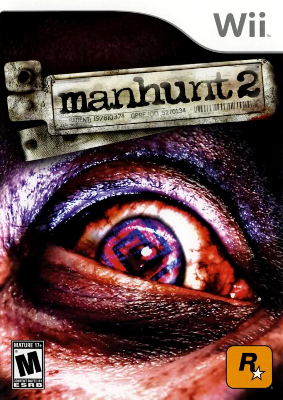
Having owned and played all four commercially-released
versions of Manhunt 2 (these being the PlayStation 2, PSP, Wii and the uncut PC version, and with the PC version no longer available), Cutting Edge recommends that fans track down the Wii version of the game. Not only are the graphics better than the
PlayStation 2 and PSP versions, but the blurring effects during the executions are slighter tamer. In addition, the Wii's motion controls bring an additional layer of interactivity, particularly during the execution sequences. At least one NPC from the
'AO' version is reinstated in the Wii version, the game's load times are shorter and additional dialogue can be heard in various levels. Craig Conner's music is also more present in the sound mix, and four exclusive weapons are also available that are
missing in the PlayStation versions. Unless the 'AO' version is ever made available again, we feel the Wii version is the definitive way to experience the chilling thrills of Rockstar's disturbing horror game.
'Rejected' graphic
licensed under Creative Commons 4.0 BY-NC.
Cutting Edge Video, Season Four, Episode 54 Manhunt Special Edition
Cutting Edge now in High Definition





